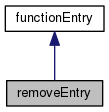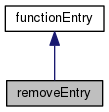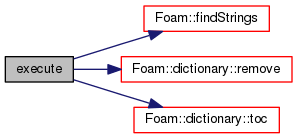Remove a dictionary entry. More...


Public Member Functions | |
| ClassName ("remove") | |
| Runtime type information. More... | |
 Public Member Functions inherited from functionEntry Public Member Functions inherited from functionEntry | |
| declareMemberFunctionSelectionTable (bool, functionEntry, execute, dictionaryIstream,(dictionary &parentDict, Istream &is),(parentDict, is)) | |
| declareMemberFunctionSelectionTable (bool, functionEntry, execute, primitiveEntryIstream,(const dictionary &parentDict, primitiveEntry &entry, Istream &is),(parentDict, entry, is)) | |
Static Public Member Functions | |
| static bool | execute (dictionary &parentDict, Istream &) |
| Execute the functionEntry in a sub-dict context. More... | |
 Static Public Member Functions inherited from functionEntry Static Public Member Functions inherited from functionEntry | |
| static bool | execute (const word &functionName, dictionary &parentDict, Istream &) |
| Execute the functionEntry in a sub-dict context. More... | |
| static bool | execute (const word &functionName, const dictionary &parentDict, primitiveEntry &, Istream &) |
| Execute the functionEntry in a primitiveEntry context. More... | |
Remove a dictionary entry.
The #remove directive takes a list or a single wordRe. For example,
#remove entry0
#remove ( entry1 entry2 entry3 otherEntry )
#remove "entry[1-3]"
#remove ( "entry[1-3]" otherEntry )
The removal only occurs in the current context. Removing sub-entries or parent entries is not supported.
Definition at line 62 of file removeEntry.H.
| ClassName | ( | "remove" | ) |
Runtime type information.
|
static |
Execute the functionEntry in a sub-dict context.
Definition at line 62 of file removeEntry.C.
References Foam::findStrings(), forAll, dictionary::remove(), and dictionary::toc().

 1.8.11
1.8.11